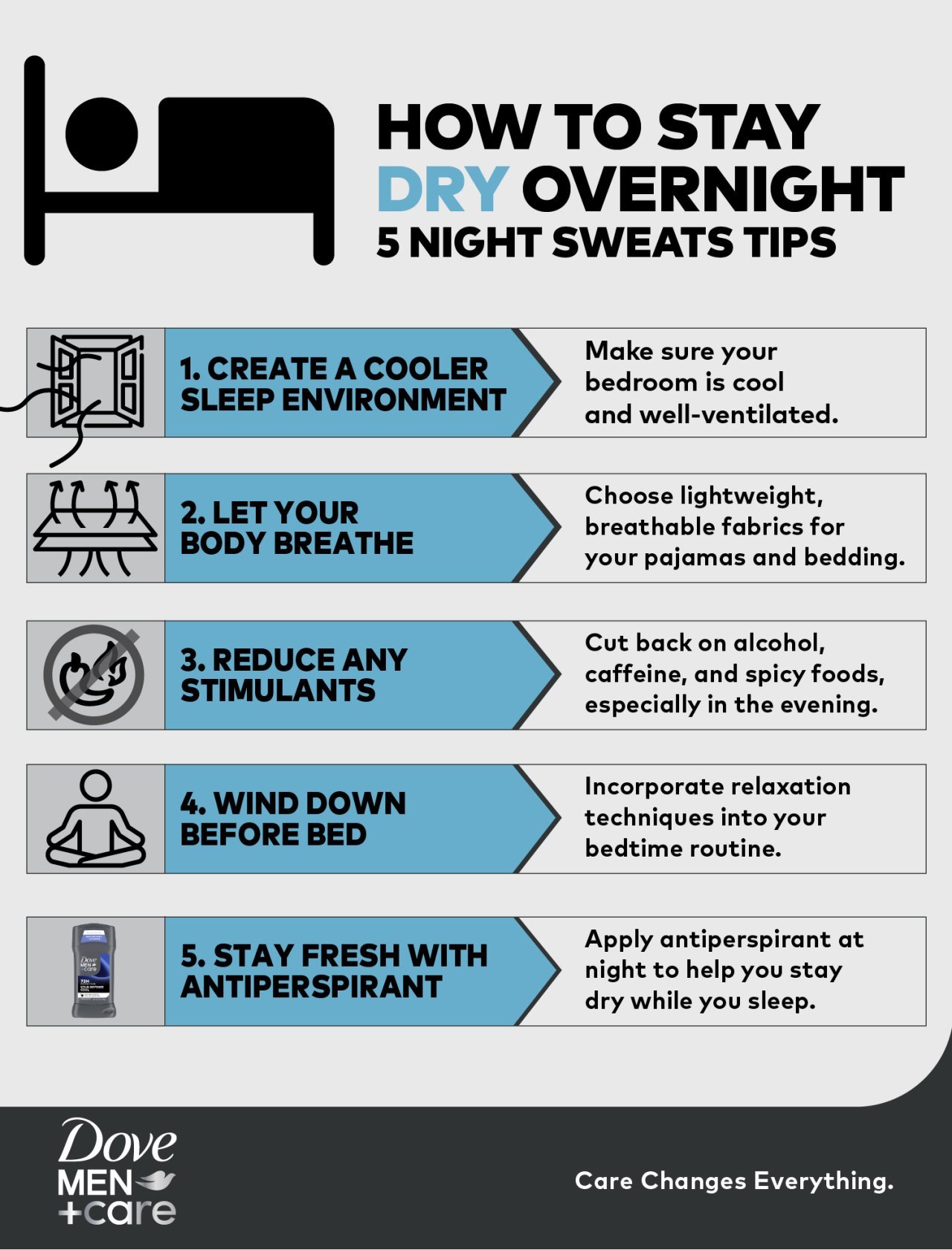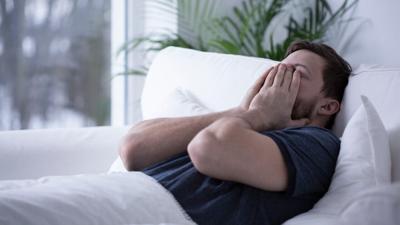![]()
Night sweats in men: Causes, tips and solutions
Night sweats are more than just a bit of perspiration — they can leave you tossing, turning, and wondering what’s going on. But what are night sweats, really? And how do they differ from normal, daytime sweating?
Night sweats refer to excessive sweating during sleep, which can soak your pajamas and sheets. Unlike regular sweating, which is your body's natural way of cooling down, night sweats can be triggered by various factors unrelated to temperature. At night, your body's thermoregulation works to maintain a stable internal temperature, but when this balance is disrupted, night sweats can start. Dove Men + Care has the details.
Common causes of night sweats in men
First, figure out what’s behind those night sweats. If you’re waking up soaked, one of these common causes could be to blame.
1. Hormonal shifts
As men get older, your hormone levels — especially testosterone — can start to shift. This drop, sometimes called andropause, can throw off your body’s internal thermostat. The result? You may start sweating more at night, even if the room isn’t hot.
2. Anxiety and stress
Can anxiety cause night sweats? Absolutely. Stress and anxiety can trigger your body's fight-or-flight response. This leads to increased sweating. If life’s been extra stressful lately, it could be a sign to check in on how you’re handling it.
3. Medications
Certain medications can mess with your body’s temperature control and lead to night sweats. If that sounds familiar, it’s worth asking your doctor if there’s a better fit.
4. Alcohol and diet
What you eat and drink matters more than you might think. Alcohol, caffeine, and spicy foods can all raise your body temperature and set off night sweats — especially if you’re overdoing it late in the day.
5. Illness or infection
Sometimes night sweats are more than just annoying — they can be a sign of something deeper, like an infection or another health issue. If they’re sticking around, it’s a good idea to get checked out and rule out anything serious.

How to stop night sweats
Now that you’ve got a handle on what’s causing night sweats, let’s talk about how to cool things down with some easy, everyday fixes:
1. Keep your bedroom cool
Crack a window, switch on a fan, or set the AC a little lower. A cooler room can make a big difference when it comes to staying dry through the night.
2. Switch up your sleep gear
Go for lightweight PJs and breathable bedding. Think cotton or moisture-wicking fabrics — anything that helps your body stay cool and lets sweat evaporate.
3. Watch what you eat (and drink)
Alcohol, caffeine, and spicy food might be your usual go-tos, but they can raise your body temp and set off night sweats. Try cutting back, especially before bed.
4. Build a solid wind-down routine
Stress doesn’t just mess with your head, it can mess with your sleep too. Try adding a few minutes of deep breathing, meditation, or anything that helps you chill before bed. It can help calm your mind and keep the night sweats in check.
5. Use antiperspirant deodorant before bed
Antiperspirant deodorant isn’t just for the morning. Putting it on at night can help you stay fresh and dry while you sleep — especially if night sweats are a regular thing.
Should you be worried about night sweats?
Night sweats can be annoying, but they’re not always a big deal. That said, sometimes they’re a sign something more serious is going on.
If the sweating doesn’t let up — or comes with other symptoms like fever or unexpected weight loss — it’s worth checking in with your doctor. Conditions like thyroid issues, infections, or other health concerns could be behind it. A quick chat with a pro can help you figure out what’s going on and how to treat it.
FAQs
Is it normal for men to sweat more at night as they age?
It’s pretty common for men to sweat more at night as they get older. Hormonal shifts, like lower testosterone, can lead to more night sweating. The good news? A few simple tweaks can help: stay hydrated, wear lightweight sleepwear, manage stress, and use a solid antiperspirant before bed.
Can night sweat be triggered by eating before bed?
Eating heavy or spicy meals before bed can trigger night sweats. These foods can raise your body temperature. Same goes for alcohol and caffeine late in the evening. To avoid that overheated, sweaty wake-up, stick to lighter meals and skip the stimulants before bed.
Yes, there are a few over-the-counter remedies that might help. Look for gentle but effective antiperspirant deodorants designed to control excessive sweating — even at night. Some men also find relief with natural supplements, though it’s best to check with a healthcare provider before trying those. Cooling pillows, moisture-wicking bedding, and fans can also make a big difference.
Night sweats are more common than most guys realize — especially as you get older, deal with stress, or fall into certain habits. The key? Don’t just shrug them off. A few small changes can make a big difference: cool down your sleep space, skip the late-night spice and drinks, and use an antiperspirant deodorant that actually does its job.
And if the sweating doesn’t let up, check in with your doctor. With the right tweaks and a bit of backup, you’ll be on your way to drier, better sleep in no time.
This story was produced by Dove Men + Care and reviewed and distributed by Stacker.





















(0) comments
Welcome to the discussion.
Log In
Keep it Clean. Please avoid obscene, vulgar, lewd, racist or sexually-oriented language.
PLEASE TURN OFF YOUR CAPS LOCK.
Don't Threaten. Threats of harming another person will not be tolerated.
Be Truthful. Don't knowingly lie about anyone or anything.
Be Nice. No racism, sexism or any sort of -ism that is degrading to another person.
Be Proactive. Use the 'Report' link on each comment to let us know of abusive posts.
Share with Us. We'd love to hear eyewitness accounts, the history behind an article.